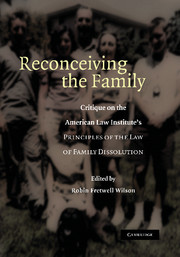 Reconceiving the Family
Reconceiving the Family Book contents
- Frontmatter
- Contents
- Acknowledgments
- Foreword, by Mary Ann Glendon
- List of Contributors
- Introduction
- PART ONE FAULT
- PART TWO CUSTODY
- PART THREE CHILD SUPPORT
- PART FOUR PROPERTY DIVISION
- PART FIVE SPOUSAL SUPPORT
- PART SIX DOMESTIC PARTNERSHIP
- PART SEVEN AGREEMENTS
- 18 The PRINCIPLES and Canada's “Beyond Conjugality” Report: The Move towards Abolition of State Marriage Laws
- 19 The ALI PRINCIPLES and Agreements: Seeking a Balance between Status and Contract
- 20 The PRINCIPLES on Agreements: “Fairness” and International Human Rights Law
- PART EIGHT JUDICIAL AND LEGISLATIVE PERSPECTIVES
- PART NINE INTERNATIONAL REFLECTIONS
- Afterword: Elite Principles: The ALI Proposals and the Politics of Law Reform, by Carl E. Schneider
- Index
18 - The PRINCIPLES and Canada's “Beyond Conjugality” Report: The Move towards Abolition of State Marriage Laws
Published online by Cambridge University Press: 25 January 2010
- Frontmatter
- Contents
- Acknowledgments
- Foreword, by Mary Ann Glendon
- List of Contributors
- Introduction
- PART ONE FAULT
- PART TWO CUSTODY
- PART THREE CHILD SUPPORT
- PART FOUR PROPERTY DIVISION
- PART FIVE SPOUSAL SUPPORT
- PART SIX DOMESTIC PARTNERSHIP
- PART SEVEN AGREEMENTS
- 18 The PRINCIPLES and Canada's “Beyond Conjugality” Report: The Move towards Abolition of State Marriage Laws
- 19 The ALI PRINCIPLES and Agreements: Seeking a Balance between Status and Contract
- 20 The PRINCIPLES on Agreements: “Fairness” and International Human Rights Law
- PART EIGHT JUDICIAL AND LEGISLATIVE PERSPECTIVES
- PART NINE INTERNATIONAL REFLECTIONS
- Afterword: Elite Principles: The ALI Proposals and the Politics of Law Reform, by Carl E. Schneider
- Index
Summary
This Chapter evaluates two law reform initiatives in North America: the Principles and the 2001 Canadian Law Commission's report entitled “Beyond Conjugality: Recognizing and Supporting Close Personal Relationships” (“Beyond Conjugality”). The Principles move “away from the idea that there can be public standards guiding marriage and parenthood. Instead it says that the central purpose of family law should be to protect and promote family diversity.” In particular, the Principles introduce rules pertaining to pre-marital agreements and domestic partnerships that undermine the very essence of marriage and present it as one of many equally valid family forms.
In this regard, the Principles follow in the footsteps of Beyond Conjugality, which proposes a revolutionary reconstitution of family law that would make State marriage laws superfluous. Beyond Conjugality promotes a registration scheme for all close adult relationships, which would include, for example, a person with disabilities and her care giver. Beyond Conjugality describes “the possibility of removing the state from the marriage business” as “worthwhile.” It models the registration scheme on marriage providing elements of both contract and status and then opens up registration to numerous types of relationships which are promoted as equally worthy of protection and assistance from the State.
The chapter is divided into three parts. Part I briefly sets the groundwork for a comparative analysis of the Principles and Beyond Conjugality.
- Type
- Chapter
- Information
- Reconceiving the FamilyCritique on the American Law Institute's Principles of the Law of Family Dissolution, pp. 351 - 371Publisher: Cambridge University PressPrint publication year: 2006


